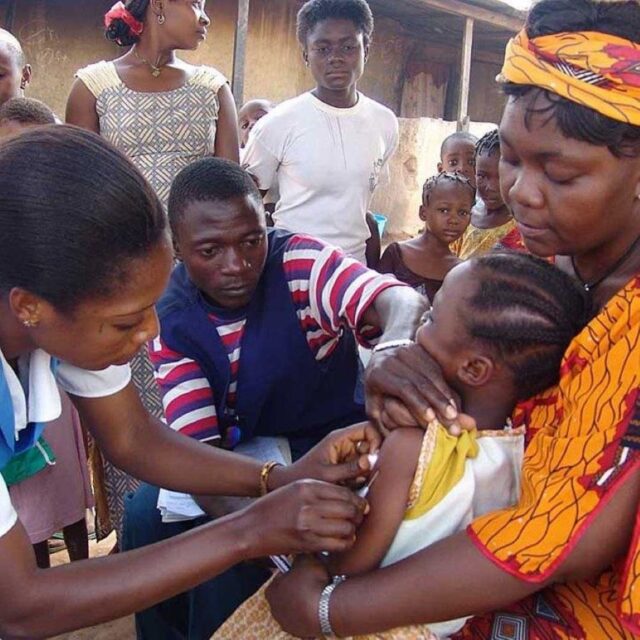
Friday, MAY 19 2023-theGBJournal | At least 64 per cent of children between ages 12-23 months in Nigeria did not receive all recommended vaccines in 2021, but some caregivers are stepping up to ensure their children get protected through vaccination.
Amongst them is Mrs Joy Armstrong, cuddling her nine-month-old son Joel under a pavilion at the Kuje General Hospital, Kuje Area Council, located in Abuja, Nigeria, waiting to access Routine Immunization (RI) service.
Joel was scheduled to receive meningitis, yellow fever and the first dose of the measles vaccine.
Mrs Armstrong a mother of three says, “Vaccines help keep our children healthy, that is why I don’t miss any of my children’s immunization schedules.
She is glad that the government caters for the well-being of their children by providing free vaccination services.
“The free vaccines mean fewer financial implications for us parents. We spend less on health problems because vaccine prevents many diseases.
We appreciate the Government, World Health Organization (WHO) and other partners for having the welfare of our children at heart. Mothers should take advantage of the opportunity of the free vaccines by ensuring their children do not skip any vaccine,” she says.
A longed-for progress
In partnership with WHO, Gavi, the Vaccine Alliance, UNICEF, and other partners, the Government of Nigeria, through the National Primary Health Care Development Agency (NPHCDA), administers 13 vaccines on its Expanded Programme on Immunization (EPI) schedule.
The latest is the rotavirus vaccine. The free Rotavirus vaccine is given orally and administered concurrently with the existing RI vaccines at six weeks, 10 weeks and 14 weeks
Underscoring the importance of vaccines, a nurse at Kuje General Hospital, Abuja, Danjuma Laraba Alanyiwunya, says the vaccine is important to prevent childhood killer diseases.
Nurse Alanyiwunya explains that the centre vaccinates approximately 150 children with 13 different types of childhood antigens (vaccines) weekly.
“We usually have impressive turnout weekly. The vaccine keeps the children healthy. With the support of the Government, WHO and other partners, we provide free daily RI services for children to protect them from many deadly diseases like Hepatitis B, measles, yellow fever, polio, and rotavirus, among others, she says.
Reaching every child
In Nigeria’s RI Programme continues to play an important role in protecting newborns and children from life-threatening diseases.
Buttressing the importance of the vaccination, the WHO Country Representative, Dr Walter Kazadi Mulombo, says “Investment in immunization remains a top priority to ensure life-saving vaccines are delivered to Children, women, adolescents and the vulnerable populations to protect them from vaccine-preventable diseases.
Dr Mulombo explains that in the last 75 years, WHO working in collaboration with countries and partners has made progress in protecting people from diseases with major achievements including smallpox eradication, reducing the incidence of polio by 99%, saving millions of lives through childhood immunization, decline in maternal mortality and improving health and well-being for millions more.
He assures of WHO continued commitment to providing technical support to the introduction of new Vaccines into Nigeria’s Routine Immunization Schedule and other health interventions.
Besides, WHO with funding from GAVI, is supporting the government of Nigeria in immunization and PHC system strengthening. The organization continues to provide guidelines to assure quality services, strengthen coordination, while supporting the Government to build health workers’ capacity; strengthen data quality and monitoring systems; improve overall management capacity for routine immunization service delivery to address equity gaps in immunization, improve coverage, reduce the current zero dose burden and strengthen primary health care.
Twitter-@theGBJournal|Facebook-the Government and Business Journal|email:gbj@govbusinessjournal.com| govandbusinessj@gmail.com









